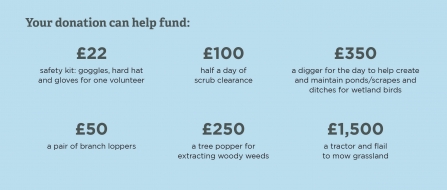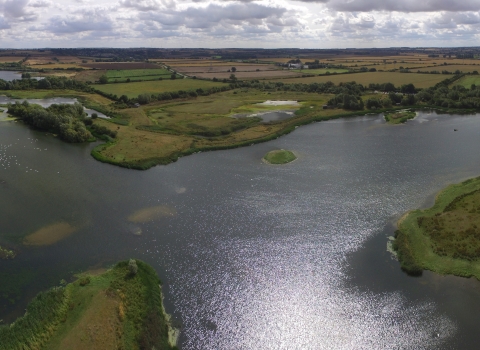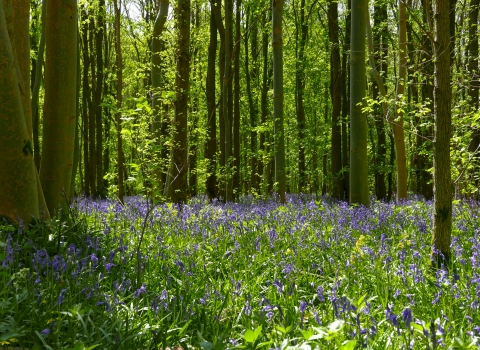photo: Andrew Bladon
Tough Love Appeal
Why do we need tough love?
Wildlife conservation results in many beautiful habitats like flower-rich grasslands, wetlands with flocks of birds and vibrant native woodlands but the process of creation can often require some tough love. In fact the work needed can look distinctly destructive, whether it's creating wetland scrapes for wading birds, felling non-native conifer trees to restore native broadleaved woodland or building new visitor infrastructure. These big projects are vital for bringing nature reserves up to spec and connecting habitats so they provide the best conditions for wildlife.


Summer Leys Panorama Drone Photo
Big works need big tools
Wetlands are high maintenance. To create a new scrape or island for safe nesting is a major operation. Maintaining ponds, river banks and ditches all require large plant machinery and the aftermath can resemble a building site before nature once again takes over. Our wetland sites need continuous work. £350 hires a digger for the day to help create and maintain ponds, scrapes and ditches for wetland birds. Over the last couple of years new ditches have been dug at Stanground Wash and several finger scrapes at the reserve provide better feeding opportunities for wading birds. Every year vegetation needs to be removed from and around the islands at Summer Leys for wintering birds. The cost this year is £3,500.

Bluebells in Waresley & Gransden Woods - Robert Enderby
Can't see the wood for the trees
Many ancient woodlands in the late 1940s were planted with non-native trees for future timber harvests. However, non-native conifers can alter and degrade the quality and diversity of an ancient woodland ecosystem, so they need to be removed, giving our native trees and plants an opportunity to regenerate. This can involve the clear felling of large areas of trees and we make use of a specialist harvester machine to speed up the job. This work benefits wildlife as our native broadleaved woodland lets in more light encouraging native woodland flora and fauna and creating a much more vibrant ecosystem.
Cowslips at Fulbourn Fen by Mark Ricketts May 2013
Scrub it out
Scrub can easily take over grassland so we have to either remove it or control it. On our chalk grassland reserves, we spend every autumn and winter battling against invasive scrub. Bushes such as blackthorn and dogwood, as well as bramble and clematis, if left unchecked, would quickly spread to shade out the sun-loving grasses and flowers that are key to the diversity of insect life on these sites. Where grazing with livestock is not possible, we have to remove scrub manually. Small shrubs are cut back or levered out using a special tool called a tree popper. It can cost £200 a day to clear an area of scrub. At Fulbourn Fen we are trialling different methods of scrub clearance, including tree poppers.
